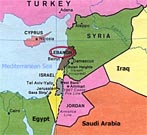Fear of assassinations haunts Lebanon on Hariri anniversary
 Beirut - Defying new assassination threats, Lebanese parliamentarian Marwan Hamadeh did something he hasn't done in years: He took a walk in Beirut's streets without a single bodyguard.
Beirut - Defying new assassination threats, Lebanese parliamentarian Marwan Hamadeh did something he hasn't done in years: He took a walk in Beirut's streets without a single bodyguard.
It would be an unremarkable event had this not been Lebanon, and had Hamadeh been any other MP.
But Hamadeh is a rarity in Lebanon's troubled recent past: an anti-Syrian legislator and former telecommunications minister who narrowly escaped an assassination attempt in October 2004.
He was the first to be targeted in a series of assassinations that on February 14, 2005 claimed the life of Premier Rafik Hariri, putting Lebanon on the path of renewed turmoil.
"I know I am a living martyr of those assassinations," he told Deutsche Presse-Agentur dpa as he strolled down from his house to the scene of the blast that left him with serious injuries and killed his bodyguard.
The ten-minute walk to the site was full of painful memories for Hamadeh. "I was lucky, not like my good friend Hariri and others."
The Valentine's Day 2005 truck bomb blast targeting Hariri's motorcade was the worst in decades, killing Hariri and more than 20 other people.
Now, as the Hariri assassination anniversary approaches, the country - which during its 1975-1990 civil war saw more than 100,000 people killed - is haunted by fear of more to come.
Earlier this week, legislator and vocal critic of Syria, Mustafa Alloush, confirmed reports of possible assassination attempts against some parliamentarians. Precautionary measures had been taken.
"We have been directly informed by the (Lebanese) army's command that some group members might be preparing for an assassination operation during this period," Alloush said.
Hamadeh says the threat has existed all along. He points the finger at the Syrian regime, which until 2005 effectively ruled Lebanon and controlled the political scene here. Damascus has consistently denied any involvement.
"Such threats were present all along the past four years, and will stay until all culprits are brought to justice," said Hamadeh.
"The Syrian regime and their allies as well as their agents in Lebanon will always be after all the free people of Lebanon, who will not stop until they know who committed the Valentine Day massacre against Rafik Hariri."
Hariri's assassination triggered an uproar and a wave of mass protests that forced Syria to end its 30-year military presence on April 26, 2005.
But the assassinations continued. Eight other anti-Syrian politicians and journalists were killed between 2005 and 2007. Lebanon demanded a United Nations probe into the Hariri killing and an international tribunal to punish the plotters behind the killings.
Shortly after Hariri's killing, the UN agreed and founded an unprecedented investigative commission. But it was a troubled process from the start, initially plagued by discredited witnesses, and accusations that the investigation would be derailed by political pressures and alleged deal-making on the international scene.
Nearly four years into the investigation, many Lebanese now doubt the real culprits will ever be brought to justice, though there are some who still hold out hope.
On March 1, an international tribunal devoted to the Hariri case is to start up in The Hague and one day it is to handle prosecution proceedings.
As they have done every year since he was killed, supporters of Hariri and the anti-Syrian camp will hold mass demonstrations in Martyr's Square, where Hariri and six of bodyguards are buried.
There they will vow - and hope - again, that all who were behind his assassination will be put on trial.
"Such a demonstration will show the Syrian regime ... that we are still committed to finding out the people who plotted and killed Hariri and take them to the international court to be punished," Hamadeh said, as he pointed to a wall still riddled with shrapnel marks from the blast that nearly took his life.
He refused to pose for pictures, insisting instead that his short walk was simply to remind himself that nothing would stop him from speaking or demanding the right punishment for the culprits.
So far, four high-ranking Lebanese generals, who were close to the Syrian regime, have been arrested in connection to the Hariri assassination.
For Hamadeh and others like the Hariri family who lost loved ones in the assassinations, justice will only be delivered when the international tribunal is established.
"Our family will be more at ease when my father's assassins are brought to justice," said Saad Hariri, son of the late Hariri, and current leader of Lebanon's anti-Syrian majority.
"We will continue to work until justice is made regarding my father and others who fell victim to such assassinations," he added.
In a country all too accustomed to political crimes going unpunished, Hamadeh says the tribunal will also achieve a broader goal: "Ending an era of impunity for murder in Lebanon." (dpa)